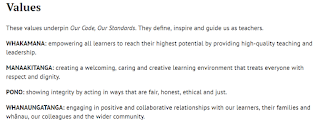Week 29 - Influence of law and ethics
How much should we share about ourselves with our students?
I nearly finished a whole blog post about the use of social media and its ethical implications before I got the courage to delete it and start afresh.
As teachers we are expected to uphold certain professional standards and stick to a code of ethics. In NZ this code changed 3 days ago. The Education Council says that,
'The Code sets out the high standards for ethical behavior that are expected of every teacher. The Standards describe the expectations of effective teaching practice. Together they set out what it is and what it means, to be a teacher in Aotearoa New Zealand. 'https://educationcouncil.org.nz/content/developing-code-of-professional-responsibilityThe values that we live by are under constant scrutiny, both inside and outside of our workplace. The four values that are listed by the Education Council can be seen below.
These values are very important to me and I see being a teacher as a key part of my identity, outlining the values that I live by. I hope to be a positive role model for students in any way that I can. As a HPE teacher this is done in many ways; by being an active participant in sport and other extra curricular activities, by being a coach, by living a healthy, balanced lifestyle etc. I talk openly with my students in health classes about topics other teachers may not, in the hope that students will feel more comfortable in sharing things about themselves. If not within the class itself, I hope it fosters a rapport whereby if students needed help they would feel safe coming to me.
But how much sharing is too much?
What is reasonable for our students to know about us? Should we censor our lives to them, telling them only part of our story? Consider whanaungatanga; by sharing I am hoping to establish a positive relationship with my learners. If I hide a parts of me am I truly being honest? Can I say that I am living up to the value of pono; behaving in a way that is honest, ethical and just?
The new code provides teachers with a document that outlines examples of behaviour that does and does not meet the code of ethics and can be found here https://educationcouncil.org.nz/sites/default/files/Code%20Guidance%20FINAL.pdf.
The code outlines several behaviours to avoid that link in with the point I am trying to make.
- encouraging a learner to develop an inappropriate emotional dependency on me
- adopting a role with a learner that is inappropriate and beyond the scope of my teaching position, such as treating the learner as a friend
- communicating with them about very personal and/or sexual matters without a valid context
Of course, these are serious breaches of ethical contact with learners and are things that I avoid in all contexts. There is the serious risk that by sharing personal information with students they could form an emotional attachment and it is important to recognise if this is happening. On a few occasions I have had students who I have felt have begun to travel down that path. It is essential that as a professional I am able to explain the boundaries clearly to the student and can pick and choose the appropriate time (with others around) and information (relative to the context and learning) to share personal information with students.
As a young teacher starting out I was very, very aware of not sharing anything personal with students. I did not want them to have any ammo against me or to take anything I said out of context. However, after some years of experience I can see the immense benefit of sharing some information with students - providing it is appropriate and relates to the learning context. In order to show them I am a positive role model, they need to see me as a human being.



Comments
Post a Comment